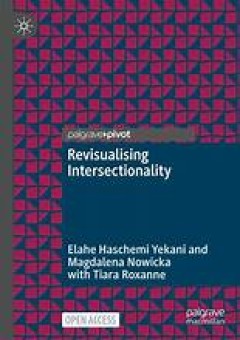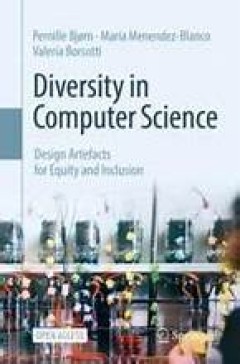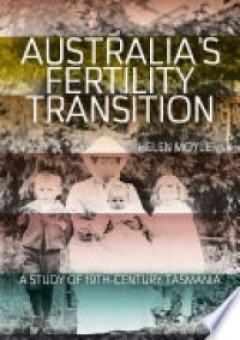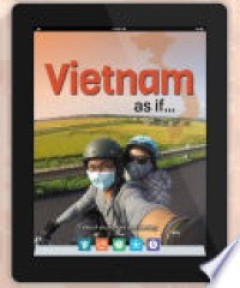Filter by

Revisualising Intersectionality
Revisualising Intersectionality offers transdisciplinary interrogations of the supposed visual evidentiality of categories of human similarity and difference. This open-access book incorporates insights from social and cognitive science as well as psychology and philosophy to explain how we visually perceive physical differences and how cognition is fallible, processual, and dependent on who is…
- Edition
- 1
- ISBN/ISSN
- -
- Collation
- -
- Series Title
- -
- Call Number
- XI, 132

21st Century Media and Female Mental Health: Profitable Vulnerability and Sad…
This open access book examines the conversations around gendered mental health in contemporary Western media culture. While early 21st century-media was marked by a distinct focus on happiness, productivity and success, during the 2010s negative feelings and discussions around mental health have become increasingly common in that same media landscape. This book traces this turn to sadness in wo…
- Edition
- 1
- ISBN/ISSN
- 978-3-031-16756-0
- Collation
- -
- Series Title
- -
- Call Number
- XIII, 224

Diversity in Computer Science
This is an open access book that covers the complete set of experiences and results of the FemTech.dk research which we have had conducted between 2016-2021 – from initiate idea to societal communication. Diversity in Computer Science: Design Artefacts for Equity and Inclusion presents and documents the principles, results, and learnings behind the research initiative FemTech.dk, which was …
- Edition
- 1
- ISBN/ISSN
- 978-3-031-13314-5
- Collation
- -
- Series Title
- -
- Call Number
- XIX, 122

The Limits of Consent
This open access book examines the ways that consent operates in contemporary culture, suggesting it is a useful starting point to respectful relationships. This work, however, seeks to delve deeper, into the more complicated aspects of sexual consent. It examines the ways meaningful consent is difficult, if not impossible, in relationships that involve intimate partner violence or family viole…
- Edition
- -
- ISBN/ISSN
- 978-3-031-46622-9
- Collation
- IX, 138
- Series Title
- -
- Call Number
- -

21st Century Media and Female Mental Health
This open access book examines the conversations around gendered mental health in contemporary Western media culture. While early 21st century-media was marked by a distinct focus on happiness, productivity and success, during the 2010s negative feelings and discussions around mental health have become increasingly common in that same media landscape. This book traces this turn to sadness in wo…
- Edition
- 1
- ISBN/ISSN
- 978-3-031-16756-0
- Collation
- -
- Series Title
- -
- Call Number
- XIII, 224

Reconstructions of Gender and Information Technology
This open access book explores what makes women decide to pursue a career in male-dominated fields such as information technology (IT). It reveals how women experience gendered stereotypes but also how they bypass, negotiate, and challenge such stereotypes, reconstructing gender-technology relations in the process. Using the example of Norway to illuminate this challenge in Western countries, t…
- Edition
- -
- ISBN/ISSN
- 978-981-99-5186-4
- Collation
- XV, 133
- Series Title
- -
- Call Number
- -

Australia’s Fertility Transition : a study of 19th-century Tasmania
In the late 19th and early 20th centuries, most countries in Europe and English-speaking countries outside Europe experienced a fertility transition, where fertility fell from high levels to relatively low levels. England and the other English-speaking countries experienced this from the 1870s, while fertility in Australia began to fall in the 1880s. This book investigates the fertility tran…
- Edition
- 1
- ISBN/ISSN
- 9781760463373
- Collation
- 318p
- Series Title
- -
- Call Number
- 304.6309946

Female Social Entrepreneurship: challenging boundaries and reframing gender a…
Das Zusammenspiel von Unternehmertum, Gender, Nachhaltigkeit und insbesondere der sozialen Dimension ist komplex und unterschätzt. Diese Studie analysiert Social Entrepreneurship durch eine Gender-Linse und stellt deutsche Sozialunternehmerinnen und ihre politischen, sozialen und ökonomischen Kontexte dar. Im Rahmen eines deskriptiven qualitativen Forschungsdesigns wurden eine Sekundäranalys…
- Edition
- Ed. 1
- ISBN/ISSN
- 9783847425304, 9783847416784
- Collation
- 292
- Series Title
- L'AGENda, 10
- Call Number
- 305.3 GER f

Mammographies: the Cultural Discourses of Breast Cancer Narratives
While breast cancer continues to affect the lives of millions, contemporary writers and artists have responded to the ravages of the disease in creative expression. Mary K. DeShazer's book looks specifically at breast cancer memoirs and photographic narratives, a category she refers to as mammographies, signifying both the imaging technology by which most Western women discover they have this d…
- Edition
- Ed. 1
- ISBN/ISSN
- 9780472029235
- Collation
- -
- Series Title
- -
- Call Number
- 305.3 DES m

Vietnam as if… : tales of youth, love and destiny
Vietnam as if… follows five young people who have moved from the countryside to the city. Their dramatic everyday lives illuminate some of the most pressing issues in Vietnam today: ‘The Sticky Rice Seller’ explores gender roles; ‘The Ball Boy’ is all about the struggles of sexual and ethnic minorities; ‘The Professional’ examines relations between rich and poor; ‘The Goalkeeper…
- Edition
- -
- ISBN/ISSN
- 9781925022315
- Collation
- 202p
- Series Title
- -
- Call Number
- 362.709597
 Computer Science, Information & General Works
Computer Science, Information & General Works  Philosophy & Psychology
Philosophy & Psychology  Religion
Religion  Social Sciences
Social Sciences  Language
Language  Pure Science
Pure Science  Applied Sciences
Applied Sciences  Art & Recreation
Art & Recreation  Literature
Literature  History & Geography
History & Geography